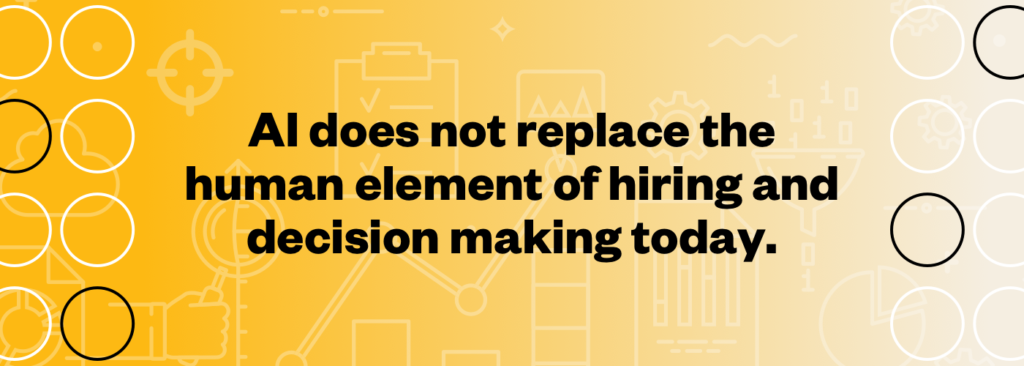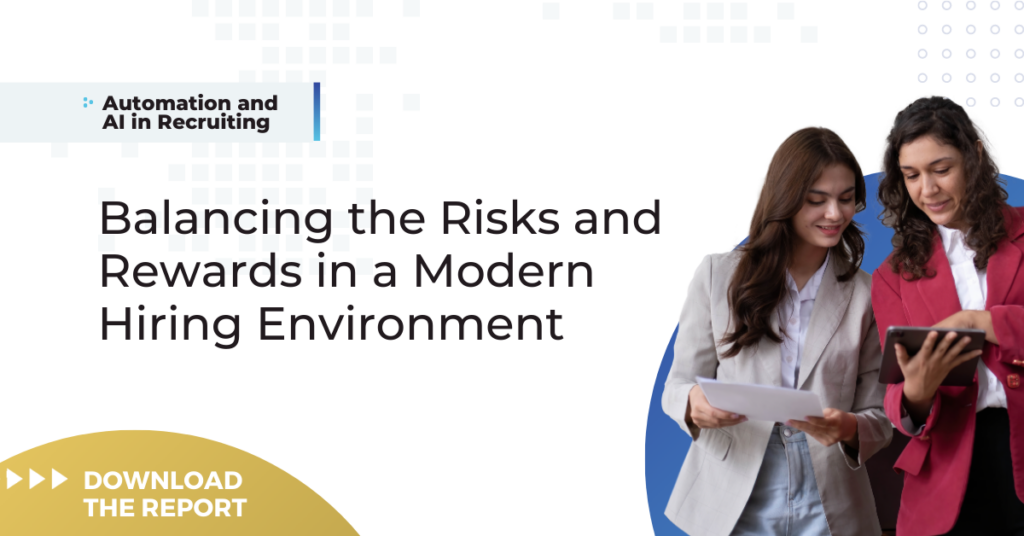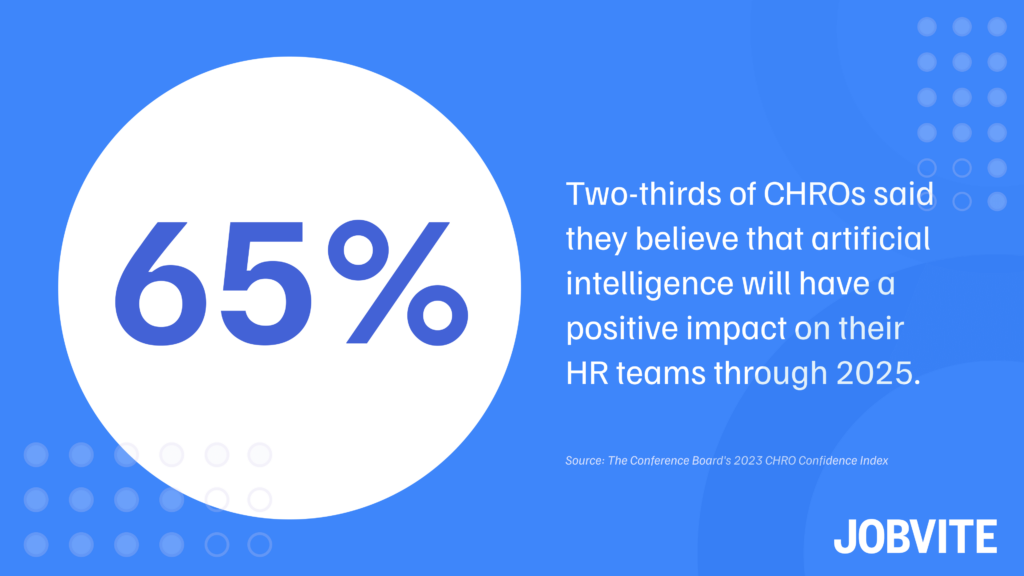The hiring process shapes the world’s capacity for innovation, transformation, and accelerated progress across industries and geographies. It can also have a profound impact on the lives of individuals. That’s why it’s so important that we make sure AI is leveraged ethically in recruiting.
Artificial intelligence holds tremendous potential for transforming the hiring process. It can help to identify top candidates more quickly and efficiently than ever before.
However, it is important to clearly define the expectations of AI. It is a tool to build platforms, processes, and technologies. It should enhance the process to build better teams and speed hiring success. However, AI does not replace the human element of hiring and decision-making today.

Certainly, AI can play a major role in ethical recruiting and hiring, but it is not the only technology businesses need to consider. Other essential factors include ensuring that data is collected ethically and that candidates are treated fairly throughout the process.
Companies that take these steps will be well-positioned to ensure that their artificial intelligence remains ethical and helps them to build a strong, diverse workforce.
Ethical implications of AI in recruiting and hiring
The ethical implications of using AI in recruiting and hiring are becoming increasingly important as technology advances. HR pros are struggling to keep up with the ethical implications of using new AI systems and are not fully confident in their ability to adhere to responsible AI regulations.
Luckily, there are hundreds of ethical AI frameworks published by organizations globally dedicated to responsible AI governance.
These frameworks can help HR pros ensure they use AI ethically and responsibly. However, it is vital to keep in mind that these frameworks are constantly evolving, and HR professionals need to stay up-to-date on the latest developments to ensure that they are using AI in a responsible manner.
With an ultra-competitive job market, employers are under more pressure to find qualified candidates quickly. Artificial intelligence can play a valuable role in helping organizations reduce their time to fill and ensure they hire the best possible candidates.
AI can help identify potential candidates early on in the process and screen them for qualifications, skills, and experience. This can save significant time and resources that would otherwise be spent conducting interviews and background checks.
In addition, AI can help identify unconscious bias in the recruiting and hiring processes and prevent discrimination against candidates.
By using AI to improve their hiring practices, organizations can hold themselves to a higher standard and ensure they are ethically and responsibly sourcing the best talent.
With increased pressure for speed in the hiring process, it’s more critical than ever to ensure efficiency, quality, diversity, and ethical hiring practices are in place. However, only 22% of organizations have an AI ethics board to help enforce a responsible AI framework.
Hold recruiting processes to a higher standard with AI tools that can prescreen candidates, identify red flags, and ensure compliance with equal opportunity laws. These tools provide data-driven recommendations for each stage of the recruiting funnel.
As the use of artificial intelligence in recruiting grows, it’s important to ensure that ethical best practices are put in place to protect the rights of job seekers.

Leveraging ethical AI recruiting technology
Businesses should consider implementing recruiting technology to help ensure that their talent acquisition solution promotes fair hiring at each step of the talent lifecycle.
To do this, businesses must first be aware of the different types of AI recruiting solutions available to them and how each one could be used in their recruiting process.
For example, predictive analytics can help identify which candidates are likely to succeed in a certain role. This info can then be used to inform decisions about which leads to interview and hire. Similarly, other forms of AI can be used to analyze job descriptions and identify unconscious bias.
By using this technology, organizations can ensure their recruiting process is as fair and unbiased as possible.
As the area of HR responsible for sourcing, you hold yourself and your team to a higher standard when it comes to recruiting. You know that the way in which candidates are sourced can have a big impact on the diversity of an organization’s workforce.
This is why you task your team to find candidates in your CRM, and trusted external sources, with relevant profiles solely using objective data. This ensures that your sourcers and your screening process is done ethically and that the passive talent network is more diverse.
By taking this approach, you set a new standard for others in HR to follow.
As any hiring manager knows, finding the right candidate for a job can be a daunting task. With hundreds of applications to sort through, it’s often difficult to know where to start.
This is where AI can come in handy.
By surfacing and prioritizing candidates that most closely fit the job requirements, AI can help save time and energy for recruiters, but also ensure that only the most qualified candidates are considered for the job.
By harnessing the power of artificial intelligence, they can streamline the hiring process and improve the quality of their candidate pool.
Technology can be a great leveler, but only when it is used correctly. In the world of recruiting, technology can help to mitigate bias, ensure privacy, and reduce avoidable risk. However, companies must choose a technology that prioritizes data quality and adheres to global regulations.
This results in a more diverse and qualified workforce and leads to better hiring decisions overall.
When companies focus on data quality and compliance, they create a level playing field for all applicants. As a result, everyone has a fair chance at getting the job they want.

Responsible use of AI recruiting tech at Jobvite
Responsible AI at Jobvite starts with our commitment to ethical, smart recruiting, while protecting your org’s values, privacy needs, and technical standards. We believe data privacy and security, fairness and accuracy, and transparency and accountability are fundamental to responsible AI.
Responsible AI is the cornerstone of everything we do at Jobvite, and we are committed to being a leading provider of responsible AI recruiting solutions.
Jobvite weaves responsible AI across our Evolve Talent Acquisition Suite, and we commit to evolving our AI according to best practices and global regulations. That way, we empower our global clients to use their technology to their advantage and the benefit of all candidates.
Jobvite offers many AI-supported features, including Job Description Grader, Bias BlockerTM, Zero-Click Intelligent Sourcing, and Candidate Engagement Scoring.
As recruiting evolves, it’s becoming increasingly clear that AI can play a valuable role in hiring. When used responsibly, AI can help to screen and identify candidates more quickly and efficiently than ever before. However, it’s important to remember that AI is only as good as the data it’s given.
As such, it’s vital for TA pros to learn how to leverage AI responsibly. With the right tech, companies can feel empowered to use AI responsibly so everyone has an equal opportunity to succeed.
Talk to our team today to learn more about Jobvite’s AI recruiting solutions and how they can benefit your org’s efforts to streamline your talent acquisition process.





